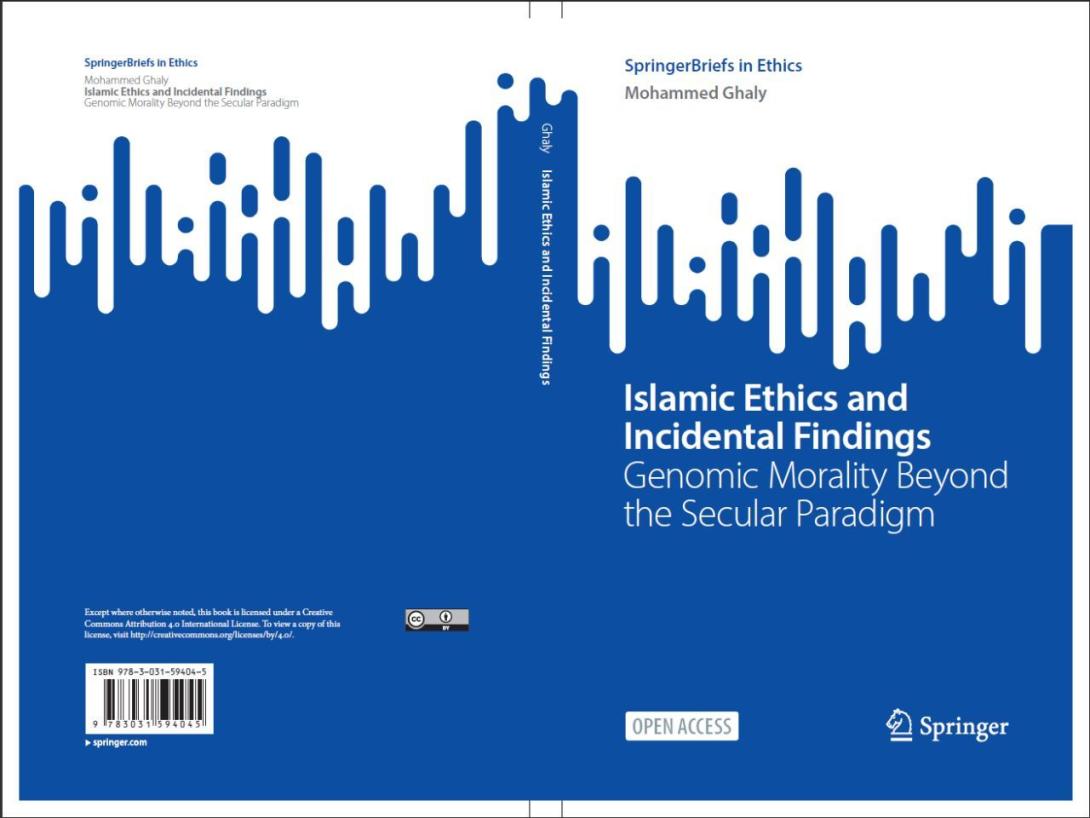
CILE Faculty Publishes A New Book On The Interplay Of Genomics, Incidental Findings And Islamic Ethics
We are thrilled to announce the release of the open-access book, Islamic Ethics and Incidental Findings: Genomic Morality Beyond the Secular Paradigm (Springer-Nature, 2024), Professor of Islam and Biomedical Ethics and the Head of the Research Center for Islamic Legislation & Ethics (CILE).
This publication explores the ethical complexities of genomics and incidental findings, with a focus on the rich traditions of Islamic moral thought. As the Muslim Arab world makes significant advancements in genomic research, this study serves as a bridge between these scientific developments and Islamic ethics, providing timely insights for both academics and practitioners.
About the Book:
- Open Access: Free and unlimited access for everyone!
- Pioneering Work: One of the first studies to explore Islamic ethics within the field of genomics.
- Comprehensive Coverage: Discusses the current state of genomic research in the Gulf region, relevant Islamic ethical considerations, and the regulatory frameworks involved.
- Practical Insights: A valuable guide for practitioners and policymakers to make informed, culturally sensitive decisions.
- Accessible to Wide Audience: Designed for readers without specialized backgrounds in either Islamic studies or genomics.
We extend our deepest gratitude to all the scientists in Qatar, Saudi Arabia, and the Gulf region, whose groundbreaking efforts in scientific research inspired this work. Your continued progress is invaluable, and we look forward to addressing further ethical challenges together.
Table of Contents
1 Introduction .................................................... 1
Genomic Allure in the Muslim World . . . . . . . . . . . . . . . . . . . . . . . . . . . . . . . 3
Understudied Topic . . . . . . . . . . . . . . . . . . . . . . . . . . . . . . . . . . . . . . . . . . . . . . . 5
Bridging the Gaps . . . . . . . . . . . . . . . . . . . . . . . . . . . . . . . . . . . . . . . . . . . . . . . . 7
Overall Structure of the Study . . . . . . . . . . . . . . . . . . . . . . . . . . . . . . . . . . . . . . 9
2 Constructing a Comprehensive Discourse . . . . . . . . . . . . . . . . . . . . . . . . . . 13
Theoretical Level: Metaethics and Normative Ethics . . . . . . . . . . . . . . . . . . . 15
Metaethics . . . . . . . . . . . . . . . . . . . . . . . . . . . . . . . . . . . . . . . . . . . . . . . . . . . . 15
Normative Ethics . . . . . . . . . . . . . . . . . . . . . . . . . . . . . . . . . . . . . . . . . . . . . . 17
Practical Level: Fivefold Classification of Human Acts . . . . . . . . . . . . . . . . 19
Applied Case: Incidental Findings (IFs) . . . . . . . . . . . . . . . . . . . . . . . . . . . . . 22
3 Ethical Judgment of What (Not) to Be Disclosed . . . . . . . . . . . . . . . . . . . . 25
Incidental Findings (IFs) as a Technical Term . . . . . . . . . . . . . . . . . . . . . . . . 26
(A) Obligatory . . . . . . . . . . . . . . . . . . . . . . . . . . . . . . . . . . . . . . . . . . . . . . . . . . . 26
A-1 Likelihood of IFs . . . . . . . . . . . . . . . . . . . . . . . . . . . . . . . . . . . . . . . . . . 27
A-2 Life-Saving Information . . . . . . . . . . . . . . . . . . . . . . . . . . . . . . . . . . . . 29
(B) Prohibited: Misattributed Paternity . . . . . . . . . . . . . . . . . . . . . . . . . . . . . . 30
B-1 Prohibited Disclosure . . . . . . . . . . . . . . . . . . . . . . . . . . . . . . . . . . . . . . . 31
B-2 Obligatory Disclosure . . . . . . . . . . . . . . . . . . . . . . . . . . . . . . . . . . . . . . 37
(C) Recommended . . . . . . . . . . . . . . . . . . . . . . . . . . . . . . . . . . . . . . . . . . . . . . . 44
C-1 Theoretical Framing: Seeking Medical Treatment (tadāwī)
and Providing Medical Care (tat.bīb) . . . . . . . . . . . . . . . . . . . . . . . . . . . . . . 45
C-2 Applied Example: ACMG List . . . . . . . . . . . . . . . . . . . . . . . . . . . . . . . 46
(D) Reprehensible . . . . . . . . . . . . . . . . . . . . . . . . . . . . . . . . . . . . . . . . . . . . . . . . 49
D-1 Theoretical Framing: Distant Lineage . . . . . . . . . . . . . . . . . . . . . . . . . 49
D-2 Applied Example: Genetic Ancestry . . . . . . . . . . . . . . . . . . . . . . . . . . 52
Afterword . . . . . . . . . . . . . . . . . . . . . . . . . . . . . . . . . . . . . . . . . . . . . . . . . . . . . . . . . 57
Appendix A: Ethical Judgments on Incidental Findings (IFs):
A Systematic Overview . . . . . . . . . . . . . . . . . . . . . . . . . . . . . . . . . 59
Appendix B: Islamic Ethics and Genomics: Drafting National Policy . . . . 63
Glossary . . . . . . . . . . . . . . . . . . . . . . . . . . . . . . . . . . . . . . . . . . . . . . . . . . . . . . . . . . . 83
References . . . . . . . . . . . . . . . . . . . . . . . . . . . . . . . . . . . . . . . . . . . . . . . . . . . . . . . . . 85
Full Text
🔗 Access the book here for free and join the conversation on how to ethically navigate the evolving landscape of genomic research.
Author
Mohammed Ghaly is professor of Islam and Biomedical Ethics, and Head of the Research Center for Islamic Legislation & Ethics (CILE), College of Islamic Studies, Hamad Bin Khalifa University, Qatar. He has a B.A. in Islamic Studies from Al-Azhar University (Egypt) and an M.A. and PhD in the same specialization from Leiden University (the Netherlands). Between 2007 and 2013, Ghaly was a faculty member at Leiden University.
Ghaly is the founding editor-in-chief of the Scopus-indexed Journal of Islamic Ethics (published by Brill). In September 2019, he assumed the role of founding Program Coordinator of the newly established M.A. in Applied Islamic Ethics at Hamad Bin Khalifa University. He also served as the Conference Chair of the 17th World Congress of Bioethics (WCB), the first WCB edition to be held in the Arab world and the entire Middle East.
Islamic Ethics and its intersection with biomedical sciences and artificial intelligence (AI) represent Ghaly’s main research interests. He is the author of Islam and Disability: Perspectives in Theology and Jurisprudence (Routledge, 2010), and Islamic Ethics and Incidental Findings: Genomic Morality Beyond the Secular Paradigm (Springer-Nature, 2024). He is the editor of the volumes Islamic Perspectives on the Principles of Biomedical Ethics (Imperial College & World Scientific, 2016),Islamic Ethics and the Genome Question (Brill, 2019), and End-of-Life Care, Dying and Death in the Islamic Moral Tradition (Brill, 2022). Ghaly is also the editor of various thematic issues, the single author of more than forty peer-reviewed publications, and an editorial board member of several academic journals. Additionally, Ghaly is also the Lead Principal Investigator (LPI) and research consultant on a number of funded research projects, the most recent of which is on “Transforming Islamic Studies in the Age of Generative Artificial Intelligence (AI)”. His publications can be accessed via https://cilecenter.academia.edu/MohammedGhaly.
